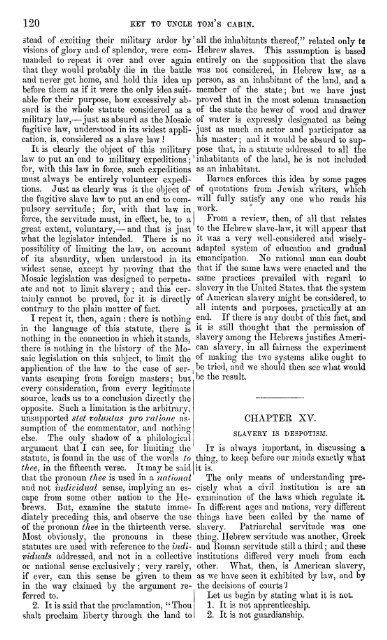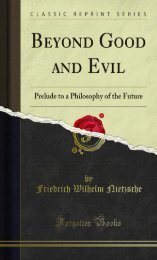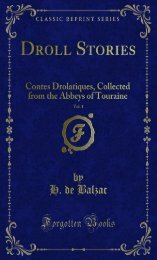UNCLE TOM'S CABIN
1iw97FV
1iw97FV
- No tags were found...
You also want an ePaper? Increase the reach of your titles
YUMPU automatically turns print PDFs into web optimized ePapers that Google loves.
120 KEY TO <strong>UNCLE</strong> <strong>TOM'S</strong> <strong>CABIN</strong>.<br />
all the<br />
"<br />
"<br />
stead of exciting military ardor by inhabitantsthereof," related onlyta<br />
shalt proclaimliberty through the land to 2. It is not guardianship.<br />
visionsof glory and- of splendor, Hebrew slaves. This assumption is based<br />
to repeat it over and over againentirely<br />
on the supposition that the slave<br />
that they would probablydie in the battle was not considered, in Hebrew law, as a<br />
and never gethome,and hold this idea up person, as an inhabitant of the land, and a<br />
before them as if it were the onlyidea suitable<br />
member of the state ; but Ave have just<br />
for their purpose, how excessively absurd<br />
provedthat in the most solemn transaction<br />
is the whole statute considered as a of the state the heAverof ayooc!and drawer<br />
military law, justas absurd as the Mosaic of Avater is expresslydesignated as being<br />
fugitive law, understood in itswidest application,<br />
just as much an actor and participator as<br />
is,considered as a slave laAV! his master ; and it Avould be absurd to suppose<br />
It is clearly the object of this military that,in a statute addressed to all the<br />
law to put an end to military expeditions ;<br />
inhabitantsof the land,he is not included<br />
for,with thislaw in force, expeditions<br />
as an inhabitant.<br />
must alwaysbe entirely expeditions.<br />
Barnes enforces thisidea by some pages<br />
Just as clearly object of of quotationsfrom JeAvish writers,Avhich<br />
the fugitive slavelaw to put an end to compulsory<br />
any<br />
will fullysatisfy one who reads his<br />
servitude ; for,with that law in work.<br />
force, the servitude must, in effect, be,to a<br />
From a review,then, of all that relates<br />
greatextent,voluntary, and that is justto the HebreAV slave-laAV, it will appear that<br />
what the legislator intended. There is no<br />
it Avas a Arery Avell-consideredand wiselyadaptedsystem<br />
possibility of limiting the law, on account<br />
of education and gradual<br />
of its absurdity, when understood in its emancipation. No rational man can doubt<br />
widest sense, except by proving that the that if the same laws Avere enacted and the<br />
Mosaic legislation was designed to same<br />
perpetuate<br />
practices prevailedAvith regardto<br />
and not to limit slavery ; and this certainly<br />
system<br />
slavery cannot be proved,for it is of American<br />
directly shiverymight be considered, to<br />
contrary to the plain matter of fact. all intents and purposes, practically at an<br />
I repeatit,then,again: there is end. If<br />
nothing<br />
there is any doubt of this fact,and<br />
in the language of this statute,there is it is stillthoughtthat the permission of<br />
nothing the connection in which it stands, shivery among the HebreAvs justifies American<br />
there is nothing the historyof the Mosaic<br />
slaArery, in all fairnessthe experiment<br />
legislation<br />
this subject, limit the of making the tAvo systems alike oughtto<br />
application of the law to the case of servants<br />
be tried, and Ave should then see what would<br />
escaping from foreignmasters ; but be the result.<br />
every consideration, from<br />
every legitimate<br />
source, leadsus to a conclusion directly the<br />
opposite. Such a limitationisthe arbitrary,<br />
unsupported voluntas pro ratione assumption<br />
CHAPTER XV.<br />
of the commentator, and nothingelse.<br />
The only shadow of a philological<br />
SLAVERY IS DESPOTISM.<br />
argument that I can see, for limiting the It is ahvaysimportant, in discussing a<br />
statute, isfound in the use of the words to thing, keep before our minds exactly what<br />
thee,in the fifteenth verse. It may be said it is.<br />
that the pronoun thee isused in a national The only means of understanding precisely<br />
and not individual sense, implyingan escape<br />
Avhat a civil institution is are an<br />
from some other nation to the Hehrews.<br />
examination of the laAvsAvhich regulate it.<br />
But, examine the statute immediately<br />
In diiferent ages and nations, very different<br />
precedingthis,and observe the use things have been called by the name of<br />
of the pronoun thee in the thirteenthverse. slavery. Patriarchal servitude Avas one<br />
Most obviously, pronouns in these thing, servitude AAras another, Greek<br />
statutes are used with reference to the individualsand<br />
Roman servitudestill a third ; and these<br />
addressed, and not in a collective institutionsdiffered very much from each<br />
or national sense exclusively ; very rarely, other. What, then,is American slavery,<br />
if ever,<br />
can this sense be givento them as we have seen itexhibited by law, and by<br />
in the way claimed by the argument referred<br />
the decisionsof courts 1<br />
to.<br />
Let us beginby stating it is not.<br />
"<br />
2. It issaid that the proclamation, Thou 1. It is not apprenticeship.




